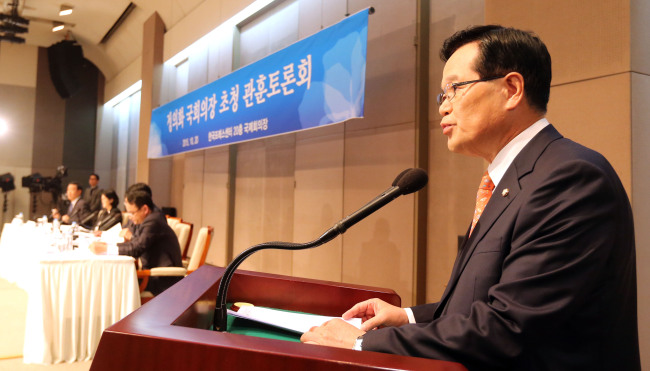Voices of opposition against the government’s state-authored textbook plan began to emerge in the ruling party ahead of the general elections next year as protests by students, teachers, scholars and activists escalated against the Education Ministry for unilaterally pushing the scheme.
Citing the lack of efforts to gather the party’s opinion and communicate with the public, some Saenuri Party lawmakers, whose constituencies are mostly located in Seoul, blasted the government’s move as a retrogressive policy that could hurt the diversity of the education system in a democratic society.
Although the group of opposing ruling party lawmakers is small, observers said the opposition might gain ground in the lead-up to next year’s general elections given the voters’ negative sentiments.
 |
| National Assembly Speaker Chung Eui-hwa. Yonhap |
“I am taken back and even flabbergasted,” said Rep. Kim Yong-tae of the Saenuri Party on Wednesday in an interview with a local broadcaster. “(The government) acts as if the state-authored textbook scheme is the only option and forces us to follow its lead. … I believe there is no consensus among the public,” said Kim.
The second-term lawmaker elected from Yangchun-gu, Seoul, cautioned that the party would lose voters in the capital city and neighboring metropolitan areas, highlighting that the constituents would oppose the move at worst or have marginal interest in the issue at best.
Kim’s criticism followed that of a fellow Saenuri lawmaker from the metropolitan area. Rep. Chung Doo-won, the three-term lawmaker for the constituency of Seodaemun-gu, Seoul, dismissed last Thursday the government’s move as a “backward” policy that hurts democratic diversity.
While saying that the current textbooks’ left-leaning bias must be addressed, Chung, who once served as vice mayor of Seoul City, asserted that the governments should follow the norm where nations refrain from monopolizing textbooks.
The escalating voice of opposition within the ruling party was seen to reflect the lawmakers’ concerns toward aggravating public opinion especially in the metropolitan area.
According to a Gallup poll released on Oct. 16, 45 percent of Seoul residents and 46 percent of Incheon and Gyeonggi Province residents opposed the adoption of the state textbooks. Nationwide polls, meanwhile, were equally split with 42 percent each for and against the textbook change.
Meanwhile, other political heavyweights from the ruling party also spoke out against the government’s plan to publish state textbooks. National Assembly Speaker Chung Eui-hwa on Tuesday expressed his regret at the lack of communication by the government to convince the public of the need for state-authored textbooks.
“(The government) should have first convinced the public about how ideologically biased the current textbooks are and then discussed whether it would push to issue state-authored textbooks or reinforce the government’s monitoring system. Though belated, we should address those procedural issues,” said Chung.
Gyeonggi Province Gov. Nam Kyung-pil also expressed his opposition to the move. In an interview with a local daily, Nam said that the government should have published better textbooks and let the public select what they consider appropriate, and not force them to choose what the government sees as right.
By Yeo Jun-suk (jasonyeo@heraldcorp.com)

